Protesters continued to gather in downtown Los Angeles, defying curfews set in response to recent immigration raids that have sparked unrest in the city. The atmosphere has been tense as clashes erupted between demonstrators and law enforcement, with significant deployment of National Guard troops and federal agents, raising concerns reminiscent of the 1992 riots sparked by the acquittal of LAPD officers involved in the beating of Rodney King.
Former LAPD chief and city councilman Bernard Parks drew a stark contrast between then and now, asserting that the current situation lacks the coordinated response seen during the riots, describing the federal presence as largely theatrical and harmful to the city’s reputation. Mayor Karen Bass echoed this sentiment, distinguishing today’s protests from the mass unrest of 1992, noting the limited nature of current disturbances and the inappropriate behavior of some protesters, which has not escalated to the level of a citywide uprising.
Bass’s call for a curfew from 8 p.m. to 6 a.m. was a direct response to escalating tensions, which included blockades on the 101 Freeway and extensive vandalism in downtown areas. As protests continued, several hundred individuals were apprehended for various actions during the demonstrations, including detainment by federal agents related to immigration status.
Local leaders expressed concern that the political differences between state and federal authorities have hampered effective resolution efforts. Dan Schnur, a political strategist from the 1992 era, pointed out the lack of cooperation compared to that time, where bipartisan actions were evident to quell unrest. Conversely, Trump’s administration has faced criticism for imposing military intervention without the state governor’s request, mirroring contentious dynamics last seen in previous decades.
Despite the limited scope of the current protests, the imagery broadcasted worldwide contributes to an exaggerated perception of chaos. Activist Earl Ofari Hutchinson highlighted this issue, stressing the disproportionate effect of sensationalized media portrayal that fosters a negative view of Los Angeles and its communities.
In this tumultuous climate, community leaders continue to call for resolution and understanding, advocating for a more accurate representation of events that do not spiral into false narratives about the city.
This situation, while concerning, serves as a reminder of the importance of dialogue and community engagement. It can be seen as an opportunity to address not only the immediate issues surrounding immigration and unrest but also the underlying tensions that need to be resolved within the community. The contrast with past events suggests that while challenges remain, there is hope for more effective resolutions through cooperation and understanding.
